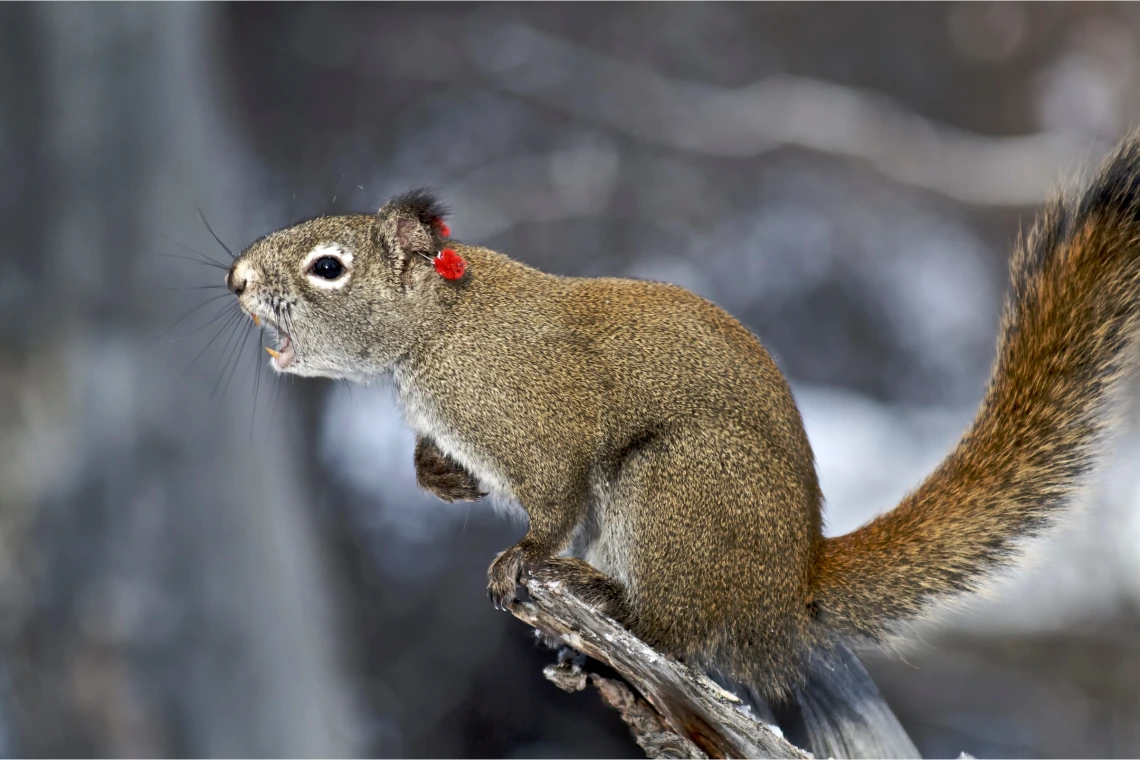Even antisocial squirrels swap microbes, revealing hidden connections at risk

A male Yukon red squirrel giving a "rattle" vocalization to deter intruders onto his territory.
All animals–including humans–are home to trillions of microbes that are crucial to health. Many of these microbes spread socially, relying on close contact or cohabitation. But what happens when those social routes don’t exist?
That’s the question researchers asked while studying fiercely territorial red squirrels in the southwest Yukon, Canada. Despite avoiding each other for most of the year, their gut microbiomes showed clear signatures of microbial sharing. The key? Crowding and trespassing.
During crowded years when squirrel population densities were high, individuals carried a more diverse set of microbes in their guts. At the same time, their gut microbiomes looked more similar to one another–a hallmark of microbial exchange. And squirrels with lots of “intruder squirrels” trespassing on their territories picked up a more diverse suite of microbes, too.

Dr. Lauren Petrullo
“Red squirrels are notoriously solitary — they aggressively defend their own individual territories, which are centered around a large hoard of food they have worked hard to collect. They rarely interact, mostly using vocalizations to deter intruders. That’s what makes these patterns so intriguing,” said lead author Dr. Lauren Petrullo, Assistant Professor of Ecology and Evolutionary Biology at the University of Arizona.
The group’s findings, published in Ecology Letters, provide the first clear evidence of social microbial transmission in a solitary species. The study has implications for understanding how microbes are exchanged in humans—whose social patterns are increasingly disrupted—and for wildlife conservation in fragmented habitats where indirect interactions may help preserve microbial health.
“These data tell us that gut microbes can hitch rides between individuals in subtle, indirect ways. We may not really need very intimate pathways of transmission like grooming to transmit microbes. Just crossing into another’s space and leaving something behind may be enough,” Petrullo explained.
Perhaps one of the most interesting findings was that specific pairs of squirrels with more instances of territorial intrusions between them had the most similar microbiomes, regardless of how close or far apart their territories were.
These squirrels are introverts; they don’t groom, they don’t huddle, and they don’t share food. Instead, the authors suggest, they may be spreading microbes through "environmental shedding,” which can occur when animals leave something behind like feces behind. In support of this explanation, the team found that it was mostly anaerobic gut microbes that were being shared, including some with the ability to tolerate some oxygen exposure.
Overall, the group's findings show that microbial networks are more pervasive and robust than previously thought.
“In many ways, Yukon red squirrels are the poster children for territoriality. That we still see signals of microbial transmission across individuals shows just how robust microbial transmission routes can be and suggests that there might be some real benefit to spreading microbes that maintains these pathways despite ‘social distancing,’” Petrullo said.
The authors hypothesize that some of those benefits might include a better ability to fight off harmful pathogens, maintain flexibility in how microbiomes respond to changes in diet or environment, and even act as reservoirs for important microbial species that squirrels might need to rely on in the future.
But the future may bring its own set of challenges. Researchers warn that these hidden microbial pathways are likely to be highly vulnerable to social and ecological disruption.
“We have already seen firsthand how pandemics can disrupt social connections in humans,” Petrullo said. “And we know that habitat loss and fragmentation can also break apart animal social networks. For squirrels, losing these few fragile threads of microbial connection might have significant costs.”
Next, the team hopes to explore the consequences—both good and bad—of microbial sharing in this system.
“We want to understand what squirrels gain or lose when they swap microbes with their rivals,” Petrullo said. “For example, this may be an additional benefit to territoriality—a squirrel could lose food to an intruder but at the same time gain important microbes.”
####
Learn more about Dr. Petrullo and her research here.

